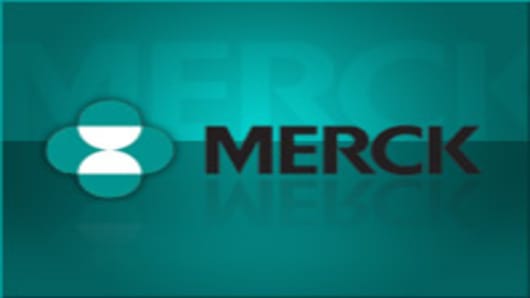Mercksaid Friday that its first-quarter profit jumped 67 percent despite lower-than-expected sales, due to lower spending on production, marketing and research as well as an arbitration charge a year ago.
The maker of Singulair for asthma and allergies said net income was $1.74 billion, or 56 cents per share, up from $1.04 billion, or 34 cents per share, a year earlier.
Excluding one-time items, Merck would have earned $3.04 billion, or 99 cents per share, up from $2.86 billion, or 92 cents per share, in 2011's first quarter. Analysts had expected earnings of 98 cents a share.
Revenue was $11.73 billion, up 1.3 percent from $11.58 billion a year ago. Analysts expected $11.83 billion.
Merck reiterated its 2012 profit forecast, for $3.75 to $3.85 per share, excluding one-time items.
"Our performance this quarter was driven by the solid contributions across our pharmaceutical, animal health and consumer care divisions and by our ongoing efforts to operate more effectively and efficiently," Kenneth C. Frazier, Merck's CEO and chairman, said in a statement.
The company took charges totalling $1.31 billion, or 43 cents a share, for integration of acquired businesses, reduced value to some assets and accounting adjustments to inventory.
Prescription drug sales rose 3 percent to $10.08 billion, led by Singulair at $1.34 billion and jumps of about 25 percent for diabetes pills Januvia and Janumet. They brought in a total of $1.31 billion, helping make up for generic competition continuing to slash sales of former blockbusters Cozaar and Hyzaar, for high blood presure.
Merck recently got U.S. approval to sell an extended-release version of Janumet, which combines Januvia and a widely used generic pill, metformin. But Singulair, Merck's top seller, goes off patent in August, creating another drain on revenue.
Sales of veterinary medicines and vaccines jumped 8 percent to $821 million on higher sales of pet and cattle products. Sales of consumer health products, including the Coppertone sun care and Dr. Scholl's foot care lines, rose 7 percent, to $554 million.
In last year's quarter, Merck took a charge of $500 million to end arbitration with health care giant Johnson & Johnson over rights to immune disorder drugs Remicade and Simponi, blockbusters with several billion dollars in annual sales.
J&J had sold them jointly with Schering-Plough, but after Merck bought Schering in November 2009, J&J sought worldwide rights to their sales. Under the arbitration settlement, Merck also gave up rights to sell the drugs in Latin America, Canada, and some other regions, reducing its revenue from the two injectable drugs in the quarter by 26 percent, to $519 million.
After the announcement, Merck shares were little changed in trading on the New York Stock Exchange.


